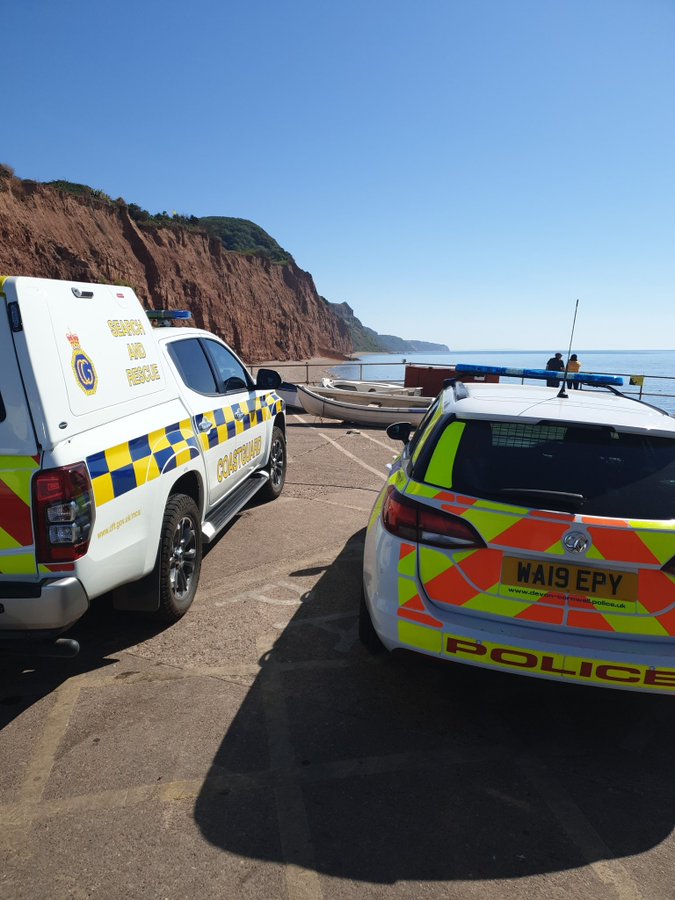The British Geological Society is researching the impact on landslides in the context of climate change.
“Coastal communities are on the front line.”
.
The latest cliff falls have been reported widely:

Sidmouth’s latest cliff collapse captured on camera | Sidmouth Herald
Another huge cliff fall in Sidmouth – live updates – Devon Live
And in the national press:
Sidmouth cliff falls send clouds of dust into air – BBC News
Dramatic moment cliff collapses onto the beach at Sidmouth | telegraph.co.uk
And the reports are looking at how the heat is affecting the stability of the cliffs:
Sidmouth: Chunks of cliff fall into sea along scorched Jurassic Coast | Metro News
Cliff dramatically collapses onto UK beach as heatwave could cause more landslides – Mirror Online
With more from today’s Guardian:
Warning as heatwave could spark cliff falls on England’s south coast
There had been “limited research” into thermal impact into landsliding but there was some evidence suggesting an association. The more clay-like components of sediments shrink through losing moisture during these hot, dry periods, while other rocks expand in the heat,” Dr Vanessa Banks, an engineering geologist with the British Geological Survey, (BGS) said. The south coast seemed more vulnerable, “which could be partly because of weak rocks and the covering of superficial deposits is not so thick”.
“This week, at Sidmouth, we had a formation called the Sidmouth mudstone formation, a fairly fine-growing soil, or weak rock, which overlays sandstone, again quite weak,” she said. The cliff fall was led by processes from the top of the cliff. “That suggests the material at the top, this Sidmouth mudstone formation, is weathered, and its erosion is enabled perhaps as a consequence of some slight movement, maybe because of a change in moisture content,” she added.
If the current heatwave was followed by intense, heavy rainfall, that could also weaken the cliffs, with potential for further rock falls, she said. The BGS is researching the impact of hot, dry weather on landslides in the context of climate change, she said. Most research had focused on heavy rainfall and flooding, which had a greater impact in terms of life and infrastructure.
Warning as heatwave could spark cliff falls on England’s south coast | Environment | The Guardian
And more from Devon Live:
Fears eroding cliffs will wipe areas off the map prompt urgent climate crisis calls
The country is in the midst of yet another heatwave with temperatures set to hit the mid 30s this week as concerns surrounding global warming continue to grow. The fears have been heightened as large parts of the Jurassic coastline in Devon have plunged into the sea…
Experts say global warming is causing sea levels to rise and that is eroding a lot of the Jurassic coastline in Dorset. The coastline suffered its biggest rock fall in over 60 years in 2021. Back then, around 300 metres of the cliff face was impacted when 4,000 tonnes came away and fell towards the beach in chunks with some of them the size of a car. This ongoing issue could see some homes completely wiped away.
Angela Terry, an environmental scientist and founder of One Home, warned: “Coastal communities are on the front line of climate change with little support available for those who face losing their homes or livelihoods. As we overheat, ice is melting faster and as a consequence sea levels are increasing by up to 5mm a year.
“More concerning is this rate continues to increase and we can not hold back the tide. Along with stronger winds, super storms are regularly battering British cliffs which are then falling into the sea as a result. With Europe’s longest coastline, we urgently need to start talking about how we will drastically cut greenhouse gas emissions.”
Fears eroding cliffs will wipe areas off the map prompt urgent climate crisis calls – Devon Live